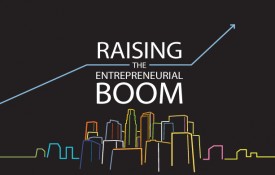In 2014, TheWrap expanded its annual Hollywood-based media leadership conference to New York City. Gail Becker addressed TheGrill NYC Branded Entertainment Conference in Manhattan on June 12 to discuss findings of Edelman’s annual study on consumer entertainment trends. Becker reproduced Edelman’s findings in an exclusive look into the global study of how content is being consumed.
Selfie-mania is at a fever pitch, taking center stage at the Oscars, Oval Office, and in our daily lives. Now, it appears the selfie is even transforming how we enjoy entertainment.
In our eighth annual study on how and why people consume and share entertainment, we found that consumers want their entertainment “selfie-style” – content centered on them, immediately gratifying, engaging and sharable across social networks.
We believe that our selfie-obsessed world is indicative of consumers’ desire to be active participants in their entertainment choices. This demand for individual influence translates into opportunities for brands. Companies that can successfully deliver or enhance compelling entertainment to consumers stand to gain through positive word-of-mouth and association.
“Binge-Watching” Continues To Escalate
The study’s findings for the U.S., U.K., and China show that with skyrocketing access to online and on-demand content, such as Netflix and Hulu, binge-watching TV shows is pervasive across all markets (U.S.: 94 percent, U.K.: 89 percent, China 99 percent). The percentage of U.S. consumers who binge-watch increased significantly in the past year (up from 86 percent in 2013), bringing them closer to China’s almost universal prevalence.
At the center of the phenomenon, binge-watching is fueled by the availability of high-quality, engaging entertainment. Why do people binge-view? Contrary to some speculation that it is to avoid online or real-life ‘spoilers’, our findings show that the primary drivers are actually internal needs. Seventy-two percent of respondents say they binge-watch to “know what happens next” and 57 percent note that they do it to “feel caught up.” Avoiding “hearing about entertainment content before getting to watch it” is a factor but less so at 24 percent. In other words, it’s the selfie-centered, internal factors that seem to matter more than any external factors.
The percentage of U.S. consumers who binge-watch increased significantly in the past year (up from 86 percent in 2013), bringing them closer to China’s almost universal prevalence.
Multi-Screen Moments
It is no surprise that today’s consumer uses other devices while enjoying entertainment regardless of the source of the content. Our findings show that half of respondents are likely to use an app or website to interact with content if it was designed by the creator of the entertainment on the first screen (56 percent U.S., 46 percent U.K. and 81 percent China) or not designed by the creator (52 percent U.S.; 44 percent U.K. and 71 percent China). Discussions, content creation and other forms of sharing used to be left up to super fans. Today, it’s an opportunity for brands to explore and participate in new and interesting ways.
U.S. Consumers – Good Content and Brand Recommendations Spur Purchase
The study also found that more than half of U.S. consumers surveyed have recommended good or engaging entertainment content to a friend or colleague (53 percent), one-third have shared that entertainment with their social networks (33 percent) and 41 percent have paid attention to future content as a result of their experience. Over a third of respondents have also purchased products or services from companies that produced good content (37 percent).
Notably, U.S. respondents consider recommendations from brands (53 percent) to be as important as positive reviews from professional critics (52 percent) for their spending decisions.
In contrast, “boring” content does not instigate as much reaction, with only a third of U.S. consumers studied saying they have criticized companies that produce bad content (34 percent). More than a quarter have refused to buy the company’s product or service (26 percent) or have ignored future content (27 percent).
Notably, U.S. respondents consider recommendations from brands (53 percent) to be as important as positive reviews from professional critics (52 percent) for their spending decisions.
Entertainment Is a Truly Global Connector
Today, entertainment is not only global in origin, but also in viewership, reverberation and ability to break down barriers.
We live in a world where a 34-year-old Korean pop musician, Psy, made online video history when his viral video, “Gangnam Style,” became the first video ever to reach 1 billion views. In May, it made history again by hitting the 2-billion mark on YouTube.
Interestingly, only three percent of “Gangnam Style” views at YouTube have been from inside South Korea. Psy’s success is a great testament to the universal appeal of entertainment. When asked, many people don’t even realize the song is in Korean.
Look at the numbers – nearly three fourths of respondents in the U.S. said that seeing entertainment online has increased their sense of global connection. In the U.S., nearly half (47 percent) said they have watched entertainment in another language – is still higher than many may have guessed.
People are so passionate about entertainment that they converse on social media about it as much as they do their own lives. U.S. respondents who use social media are as likely to share content about entertainment as they are content about their friends and family.
Today’s global consumers expect unprecedented control over what they watch and when and where they watch it. They want content instantaneous, self-revolving, engaging them in the moment and engaging others at their choosing.
In short, they want entertainment selfie style…and who amongst us can blame them?
Gail Becker is president of strategic partnerships and global integrations at Edelman, the largest PR firm in the world.













































